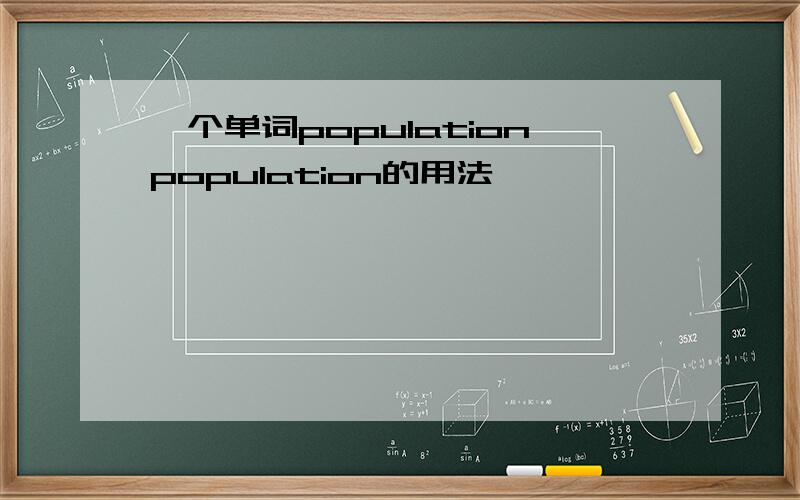一个单词populationpopulation的用法
来源:学生作业帮助网 编辑:作业帮 时间:2024/07/13 09:22:19

一个单词populationpopulation的用法
一个单词population
population的用法
一个单词populationpopulation的用法
思路分析]
如下
[解题过程]
population是一个集合名词,它的用法有时较为特殊,所以很容易用错.下面谈一下它的用法.
一、population常与定冠词the连用,作主语用时,谓语动词常用第三人称单数形式.例如:
The world\'s population is increasing faster and faster.全世界的人口增长得越来越快.
At the beginning of the twentieth century,the world\'s population was about 1,700 million.在二十世纪初,全世界的人口大约是十七亿.
二、当主语是表示\"人口的百分之几、几分之几\"时,谓语动词用复数形式.例如:
About seventy percent of the population in China are farmers.中国大约有百分之七十的人口是农民.
三、有时population可用作可数名词,其前可用不定冠词.例如:
China has a population of about 1.3 billion.(=There is a population of about 1.3 billion in China.) 中国大约有十三亿人口.
New York is a big city with a population of over 10 million.纽约是一个有一千多万人口的大城市.
在表示多个地区的人口时,population要用复数形式populations.例如:
Many parts of the world,which once had large populations and produced plenty of crops,have become deserts.世界上很多地区一度人口众多,种植大量的农作物;现在,这些地区已经变成了沙漠.
四、表示人口的\"多\"或\"少\",不用\"much\"或\"little\",而要用\"large\"或\"small\".例如:
India has a large population.印度人口众多.
Singapore has a small population.新加坡人口少.
五、询问某国、某地有多少人口时,不用\"How much...\",而用\"How large...\";在问具体人口时用\"What...\".例如:
-How large is the population of your hometown?你们家乡有多少人口?
-The population of our hometown is nearly twice as large as that of yours.我们家乡的人口是你们家乡人口的将近两倍.
-What is the population of Canada?加拿大的人口有多少?
-The population of Canada is about 29 million.加拿大的人口大约有二千九百万.
六、population还表示\"某地、某类的动、植物或物品的总数\".例如:
In India,however,the population of tigers has increased,from 2,000 in 1972 to about 5,000 in 1989.然而在印度,老虎的总数已从1972年的2,000只增长到了1989年的大约5,000只.
population
KK: []
DJ: []
n.
1. 人口[U][C]
The population of this country rose by 10 percent.
这个国家的人口增长了百分之十。
The country has a population of 100 million.
这个国家有一亿人口。
2...
全部展开
population
KK: []
DJ: []
n.
1. 人口[U][C]
The population of this country rose by 10 percent.
这个国家的人口增长了百分之十。
The country has a population of 100 million.
这个国家有一亿人口。
2. (某地域的)全部居民[the S][G]
Only ten percent of the population here is illiterate.
这里只有百分之十的居民是文盲。
3. (具有共同特色的)人们;(某地域的)特定居民[the S][G]
4. (某地区某类)动物(或植物)的总数;(某地区某类)物品的总数[the S][G]
The elephant population in that area is falling.
那个地区的大象总数在下降。
5. 【生】族群
6. 【统】(对象)总体,母体
收起
人口
人口
[U][C]
不可数名词
一般用于the population of+n.
不管后面接的名词是不是复数
谓语都用单数
population是一个集合名词,它的用法有时较为特殊,所以很容易用错。下面谈一下它的用法。
一、population常与定冠词the连用,作主语用时,谓语动词常用第三人称单数形式。例如:
The world\'s population is increasing faster and faster. 全世界的人口增长得越来越快。
At the beginning ...
全部展开
population是一个集合名词,它的用法有时较为特殊,所以很容易用错。下面谈一下它的用法。
一、population常与定冠词the连用,作主语用时,谓语动词常用第三人称单数形式。例如:
The world\'s population is increasing faster and faster. 全世界的人口增长得越来越快。
At the beginning of the twentieth century, the world\'s population was about 1,700 million. 在二十世纪初,全世界的人口大约是十七亿。
二、当主语是表示\"人口的百分之几、几分之几\"时,谓语动词用复数形式。例如:
About seventy percent of the population in China are farmers. 中国大约有百分之七十的人口是农民。
三、有时population可用作可数名词,其前可用不定冠词。例如:
China has a population of about 1.3 billion. (=There is a population of about 1.3 billion in China.) 中国大约有十三亿人口。
New York is a big city with a population of over 10 million. 纽约是一个有一千多万人口的大城市。
在表示多个地区的人口时,population要用复数形式populations。例如:
Many parts of the world, which once had large populations and produced plenty of crops, have become deserts. 世界上很多地区一度人口众多,种植大量的农作物;现在,这些地区已经变成了沙漠。
四、表示人口的\"多\"或\"少\",不用\"much\"或\"little\",而要用\"large\"或\"small\"。例如:
India has a large population. 印度人口众多。
Singapore has a small population. 新加坡人口少。
五、询问某国、某地有多少人口时,不用\"How much...?\",而用\"How large...?\";在问具体人口时用\"What...?\"。例如:
-How large is the population of your hometown? 你们家乡有多少人口?
-The population of our hometown is nearly twice as large as that of yours. 我们家乡的人口是你们家乡人口的将近两倍。
-What is the population of Canada? 加拿大的人口有多少?
-The population of Canada is about 29 million. 加拿大的人口大约有二千九百万。
六、population还表示\"某地、某类的动、植物或物品的总数\"。例如:
In India, however, the population of tigers has increased, from 2,000 in 1972 to about 5,000 in 1989. 然而在印度,老虎的总数已从1972年的2,000只增长到了1989年的大约5,000只。
收起
popu•la•tion /ppjulen; NAmE pp/ noun
1 [C+sing./pl. v., U] all the people who live in a particular area, city or country; the total number of people who live there: One third of the w...
全部展开
popu•la•tion /ppjulen; NAmE pp/ noun
1 [C+sing./pl. v., U] all the people who live in a particular area, city or country; the total number of people who live there: One third of the world’s population consumes / consume two thirds of the world’s resources. The entire population of the town was at the meeting. countries with ageing populations Muslims make up 55% of the population. an increase in population areas of dense / sparse population (= where many / not many people live) The population is increasing at about 6% per year. Nigeria has a population of nearly 100 million. to control population growth population density
2 [C+sing./pl. v.] a particular group of people or animals living in a particular area: the adult / working / rural, etc. population of the country The prison population (= the number of people in prison) is continuing to rise. Oil spillages are disastrous for fish populations
来自牛津高阶
收起